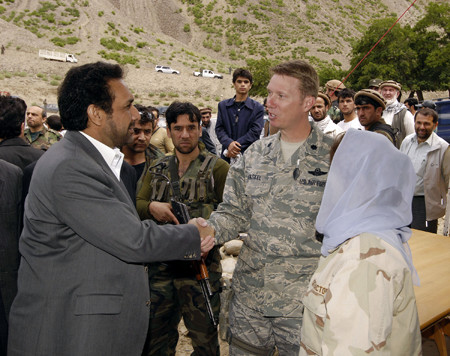By Daily Mail Reporter
Classified diplomatic cables lay bare the extent of corruption at the highest level in Afghanistan, with cash apparently pouring out of the country.

Former Afghan VP, Zia Massoud.
One report claims former vice-president Ahmad Zia Massoud flew into Dubai with $52million in cash and was never asked to explain where it came from.
U.S. envoy Karl Eikenberry told America that 'vast amounts of cash come and go from the country on a weekly, monthly and annual basis'.
Before last year's presidential election, some $600 million in banking system withdrawals were reported.
Another cable detailed how the transportation ministry collects $200 million a year in trucking fees but only $30 million is turned over to the government.
'Individuals pay up to $250,000 for the post heading the office in Herat, for example, and end up owning beautiful mansions as well as making lucrative political donations,' Wahidullah Shahrani, now the mines minister, was quoted as saying.
The governor of Ghazni, Usman Usmani, and governor of Paktiya, Juma Khan Hamdard, are accused of corruption, extortion and theft of public funds.
One cable said: 'Credible sources indicate that some of the most senior government officials in [Ghazni] province have chronically engaged in significant corrupt acts: embezzling public funds, stealing humanitarian assistance and misappropriating government property, among others.'
'The consistency and scope of explicit and detailed allegations lends veracity to charges that pervasive corruption defrauds the people of meaningful government services and significantly undermines popular support for the Afghan government.'
In Paktiya, Hamdard allegedly takes bribes fromc ontractors by sending in armed men to hold contractors at construction sites until the money is paid.
Other messages display the U.S. conviction that Hamid Karzai's brother Ahmad Wali (AWK), a council chairman in Kandahar, is corrupt.
In June 2009, a cable said he was only interested in massing money and power 'through a network of political clans and the use of state institutions to protect and enable licit and illicit enterprises'.
It adds that AWK's main aim was 'the enrichment, extension and perpetuation of the Karzai clan'.
KARZAI IS 'PARANOID AND WEAK AND BLAMES U.S'
The U.S. envoy to Afghanistan calls President Hamid Karzai a 'paranoid,' 'weak' and 'overly self-conscious' leader who may never stop America-bashing.
Karl Eikenberry accused Karzai of failing to grasp the 'most rudimentary principles of state-building', according to cables released by WikiLeaks.
'His deep seated insecurity as a leader combine to make any admission of fault unlikely, in turn confounding our best efforts to find in Karzai a responsible partner,' he wrote in July 2009.
State corruption was considered the norm with another cable claiming the likely new Afghan cabinet only contained one minister 'about whom no allegations of bribery exist'.
The documents show a deep U.S. anxiety over the partnership with Kabul.
Eikenberry told the U.S. Karzai had two competing personalities: 'The first is a paranoid and weak individual unfamiliar with the basics of nation-building and overly self-conscious that his time in the spotlight of glowing reviews from the international community has passed.'
He also said Karzai was an 'ever-shrewd politician who sees himself as a nationalist hero' who used a 'blame America' tactic to deflect criticism of his administration.
The envoy describes trying to 'refocus' Karzai away from his 'anti-U.S. conspiracy theories' in conversations.
Questions about weak governance and corruption have long driven a wedge between Karzai and many of the Western leaders who have nearly 150,000 soldiers in Afghanistan.
Afghanistan ranked 176th, ahead of only Somalia, in Transparency International's corruption index issued last month.
The Pentagon, in a report to the U.S. Congress, noted there was a 'questionable' commitment by Kabul to prosecuting corruption.



